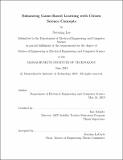Enhancing game-based learning with citizen science concepts
Author(s)
Lee, Nayoung,M. Eng.Massachusetts Institute of Technology.
Download1129384307-MIT.pdf (18.72Mb)
Other Contributors
Massachusetts Institute of Technology. Department of Electrical Engineering and Computer Science.
Advisor
Eric Klopfer.
Terms of use
Metadata
Show full item recordAbstract
TaleBlazer is a location-based augmented reality platform for educational mobile games. Currently, typical TaleBlazer games enhance passive learning by engaging players in a fictional narrative, but the platform lacks the capabilities to promote active observation of the real world in its games. On the other hand, there have been numerous past projects and initiatives that note the positive impact of citizen science on participants' curiosity and observation about the world around them. For this reason, I have worked to incorporate citizen science concepts and themes into TaleBlazer. Many of the concepts that are central to citizen science focus on giving participants the ability to collect information; however, due to limitations of the Tale- Blazer platform, there is no easy way for players to input information into the games. In order to improve TaleBlazer in respect to this limitation, I have added features that allow players to input information into TaleBlazer games. I have implemented two new types of agents (in-game entities): an agent that allows players to tag their current location as a point of interest, which players can review later in the game, and an agent that can use a player's input to impact the game. I have also implemented a form editor on the online web interface that allows game developers to customize the types of input that plays can submit. These new features not only enhance learning, but also open the door for games that can build on top of player-generated content instead of relying solely on game developer-generated content.
Description
This electronic version was submitted by the student author. The certified thesis is available in the Institute Archives and Special Collections. Thesis: M. Eng., Massachusetts Institute of Technology, Department of Electrical Engineering and Computer Science, 2019 Cataloged from student-submitted PDF version of thesis. Includes bibliographical references (page 73).
Date issued
2019Department
Massachusetts Institute of Technology. Department of Electrical Engineering and Computer SciencePublisher
Massachusetts Institute of Technology
Keywords
Electrical Engineering and Computer Science.